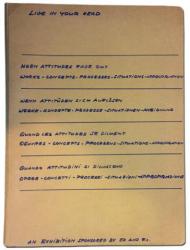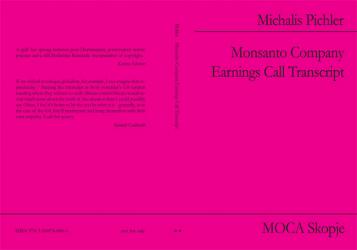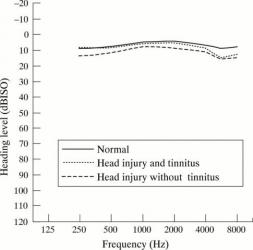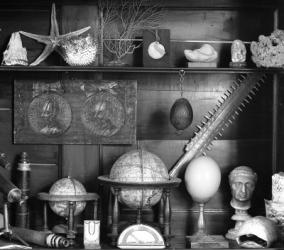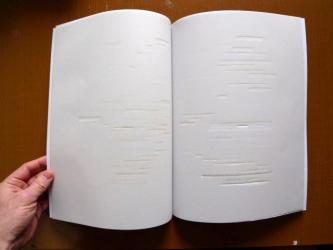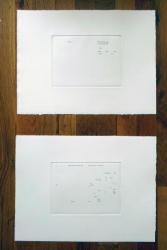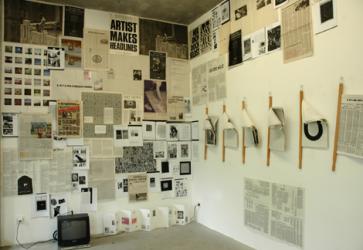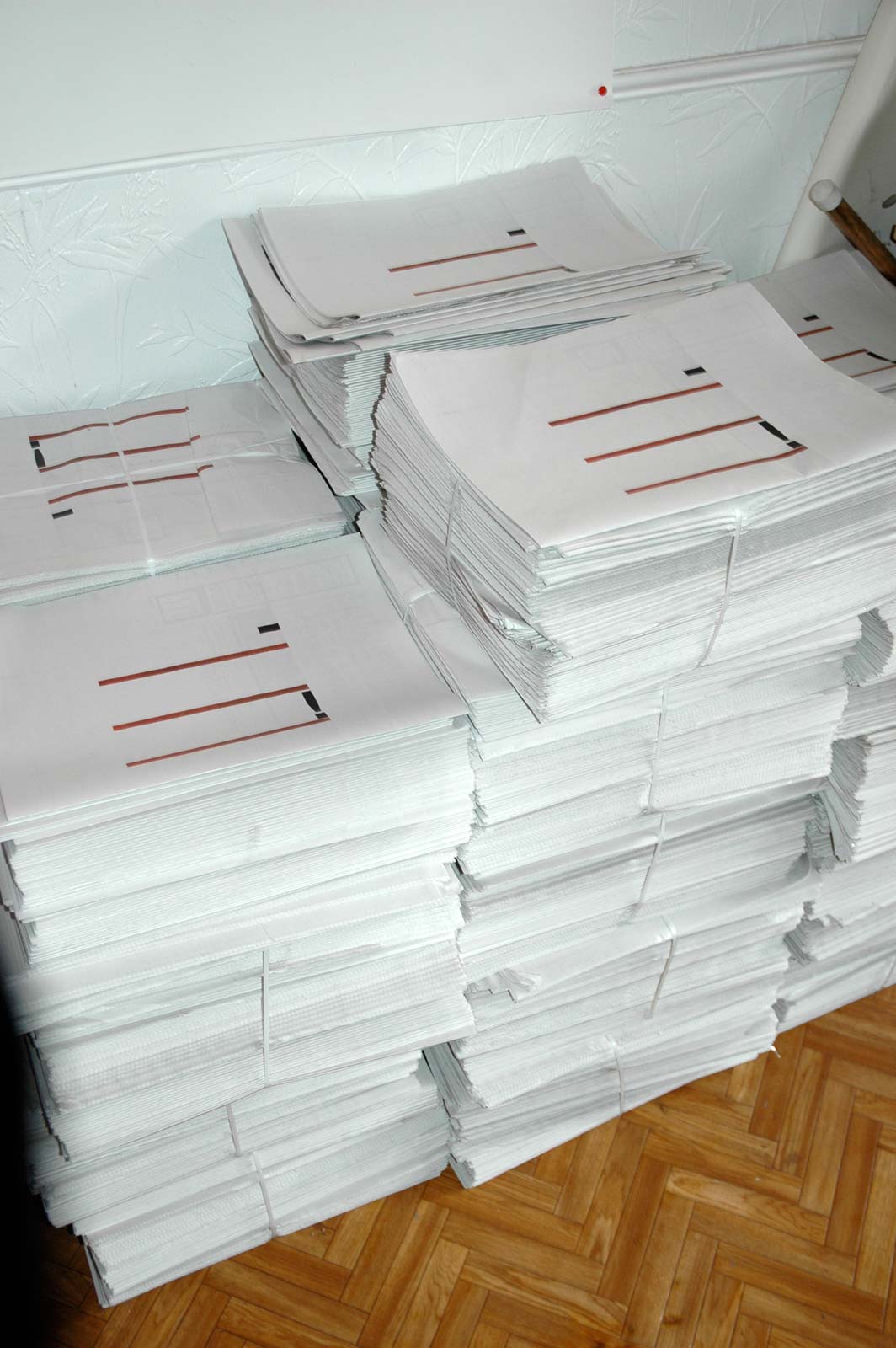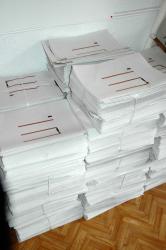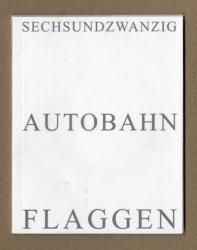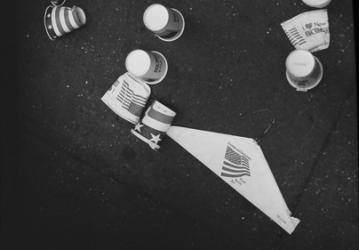news
WHEN ATTITUDES FADE OUT
QUAND LES ATTITUDES SE DILUENT
EDGAR ARCENEAUX, DORO BOEHME, MARCEL BROODTHAERS, JEFFREY BROUWS, CORINNE CARLSON - MARLA HLADY - KAREN HENDERSON, WALTER DAHN, SHAWNA DEMPSEY - LORRI MILLAN, ERIC DOERINGER, JIRI GEORG DOKOUPIL, MARCEL DUCHAMP, SAMMY ENGRAMER, JOËL FISHER, THOMAS GALLER, ANNE VALERIE GASC, RODNEY GRAHAM, RICHARD JACKSON, MARTIN KIPPENBERGER, TANJA LAZETIC, SARA MACKILLOP, JONATHAN MONK, FRANÇOIS MORELLET, SIMON MORRIS, BRUCE NAUMAN, MICHALIS PICHLER, ACHIM RIECHERS, ALLEN RUPPERSBERG, ED RUSCHA, TOM SACHS, JEAN-FREDERIC SCHNYDER, YANN SERANDOUR, JIM SHAW, DEREK STROUP, DEREK SULLIVAN, ERIC TABUCHI, LOUISA VAN LEER, LAWRENCE WEINER, HERMANN ZSCHIEGNER
Museum of Contemporary Art Skopje Description of project: "European and international artists are asked to present works in the exhibition The apparatus of life and death. In fact, SEAFair 2010 will convey the story of artists attempting to navigate through the maize of the newly constructed global bio-political apparatus, in a changing social matrix, in which the rules are just being set (new rules being established and old rules which are vanishing). In the unstable and confused process, unwanted features of the murky waters slowly start showing up with some the participants swimming nicely in them whereas others are maladjusted.
October 1 - 22 2010
Curated by Seth Kim-Cohen Artists, in alphabetical order: Doug Barrett, Violin Tuned D.E.E.D.
Diapason Gallery, October 2010
Opening Friday, October 1, 7pm
Installations run Saturdays, October 2, 9, 16, 23, 2pm-8pm
Rozalinda Borcilla, Listening for Beginners
Seth Cluett, Tracing Moving Circles (Neighborhood Memory)
Chris Cuellar, Tactical Archiving
Benedict Drew, Drum Loop
Jarrod Fowler, Rhythmsystemics
Seth Kim-Cohen, Critique of Instrumental Reason (by use of drums)
Chris Kubick and Anne Walsh, To Make The Sound of Fire
Corey Larkin, Monochrome
Lou Mallozzi, Screenplay: one and one
Christof Migone, 4 Feet and 33 Inches
Matthew Mullane, Détourned Down: A Conversation with Seth Kim-Cohen
Rob Mullender, Said Object / Daughter’s Voice From Memory
Michalis Pichler, Un coup de dés jamais n’abolira le hazard (Musique)
Michelle Rosenberg, Whistle Wall
Jennifer Schmidt, Hard Times / Scrabble Value: A Conversation in 2 Parts
Benjamin Thorp, Black Box
Heather and Seth Warren-Crow, Grayface
James Whitehead (JLIAT), Esse Est Percipi?
Curated by Polyna Kosmadaki and Christopher Marinos (within the framework of Zone D of the Zoumboulakis Gallery) 27 September–30 October 2010
Tue–Wed–Fri 15.00–21.00, Thu 15.00– 24.00, Sat12–21.00, Sun & Mon closed
Building A: 10 Agias Irinis Sq. Building B: Vassilikis 2 & P. Skouze & Limpona, Athens
September 22, 2010 - December 4, 2010 Vito Acconci, Juan Arkotxa & Leslie Mackenzie, Bernard Baschet & Francois Baschet, Cathy Berberian & Eugenio Carmi, George Brecht, Inge Bruggeman & Hank Lazer, Jose Luis Castillejo, Jon Gibson, Kenneth Goldsmith, Grace Jones, Jennie C. Jones, Allan Kaprow, Dan Lander & Micah Lexier, Christian Marclay, Marshall McLuhan with Jerome Agel, Quentin Fiore, & John Simon, Michalis Pichler, Steve Roden, Allen Ruppersberg, Tate Shaw & Andrew Sallee, Masumi Shibata, Michael Snow, Jan van der Marck/Art by Telephone, and Dennis Yuen & Morry Galonoy
at The Center For Book Arts
Saturday, 4 September to Sunday, 31 October 2010 The Laurence Sterne Trust and Information as Material are proud to announce a major exhibition of ‘conceptual writing.’ Unfolding around Craig Dworkin’s book collection, the show features work by Edwin Abbott Abbott, Walter Abish, Vito Acconci, Kathy Acker, Bruce Andrews, Guillaume Apollinaire, Antonin Artaud, Paul Auster, John Baldessari, JG Ballard, Fiona Banner, Georges Bataille, derek beaulieu, Samuel Beckett, Dodie Bellamy, Hans Bellmer, Caroline Bergvall, Jen Bervin, Nayland Blake, Giovanni Boccaccio, Riccardo Boglione, Maurice Blanchot, Christian Bök, Jorge Luis Borges, Alastair Brotchie, Pavel Büchler, Paul Buck, William S. Burroughs, John Cage, Sophie Calle, Miguel De Cervantes, Jake & Dinos Chapman, Elisabeth S. Clark, Steven Clay, Carlo Collodi, Joseph Conrad, Coracle Press, Daniel Defoe, Charles Dickens, Craig Dworkin, Michael Farion, Robert Fitterman, Gustave Flaubert, Sigmund Freud, Edward Gibbon, Allen Ginsberg, Mary Godolphin, Kenneth Goldsmith, Douglas Gordon, Rodney Graham, Brion Gysin, Lucy Harrison, Ernest Hemingway, Eugène Ionesco, Sarah Jacobs, Peter Jaeger, Alfred Jarry, James Joyce, On Kawara, Emma Kay, Arnold Kemp, Arnold Kemp, Jack Kerouac, Sharon Kivland, Richard Kostelanetz, Joseph Kosuth, Jacques Lacan, Sherrie Levine, Sol Le Witt, Gareth Long, John McAndrew, John McDowall, Stéphane Mallarmé, W. H. Mallock, Michael Maranda, Harry Mathews, Herman Melville, Yukio Mishima, Simon Morris, Scott Myles, Friedrich Nietzsche, George Orwell, Peter Osborne, Georges Perec, Tom Phillips, Michalis Pichler, Vanessa Place, Simon Popper, Ezra Pound, Marcel Proust, Karen Reimer, Gerhard Richter, Kim Rosenfi eld, Jerome Rothenberg, Raymond Roussel, Dirk Rowntree, Ed Ruscha, Klaus Scherübel, Peter Schlemihl, Yann Sérandour, William Shakespeare, Robert Smithson, Daniel Spoerri, Gertrude Stein, Laurence Sterne, Chris Taylor, Carolyn Thompson, Nick Thurston, Alison Turnball, herman de vries, Lawrence Weiner, Darren Wershler, Robert Williams, Wilf Williams, Ludwig Wittgenstein, and Greville Worthington.
at Shandy Hall, the former home of writer Laurence Sterne
Opening hours: 2nd Cannons, Los Angeles | AKV, Berlin | Anita Di Bianco, Berlin/New York | Archive Books, Berlin/Turin | Archive of Modern Conflict, London | argobooks, Berlin | Barbara Wien Wilma Lukatsch, Berlin | Bartleby & Co., Brussels | Boekie Woekie, Amsterdam | Book Works, London | Chicago – Times – Plotter [...] Paper – Libertine – Trixie, Vienna | documentation céline duval, Houlgate | Edie Fake, Chicago | Edition Patrick Frey, Zurich | Erik Steinbrecher, Berlin | Eva Weinmayr, London | Fucking Good Art, Rotterdam | GAGARIN, Antwerp | GRAPHIC, Seoul | Half Letter Press/Temporary Services, Chicago | Mediabus, Seoul | Michael Baers, Berlin | Michalis Pichler/"greatest hits", Berlin | Mladen Stilinovic, Zagreb | Mörel Books, London | no press/derek beaulieu, Calgary | Piktogram/Bureau of Loose Associations, Warsaw | Regency Arts Press Ltd., New York | Revolver Publishing, Berlin | Roma Publications, Amsterdam | Samandal, Beirut | Space Poetry, Copenhagen | Spector Books, Leipzig | Sternberg Press, Berlin/New York | The Green Box, Berlin | Torpedo Press, Oslo | Ugly Duckling Presse,New York |(un)limited store, Marseille | urban art info, Berlin | Verlag der Buchhandlung Walther König, Cologne | Vitamine Creative Space, Beijing | Weproductions, Deuchar Mill, Yarrow | Zavod P.A.R.A.S.I.T.E., Ljubljana | ZINE'S MATE, Tokyo
![]()

![]()
3-5 September 2010
KW Institute for Contemporary Art
Auguststraße 69
10117 Berlin
www.kw-berlin.de
![]()
Friday, September 3, 3 – 7 pm
Saturday & Sunday, September 4 & 5, noon – 7 pm
3-5 September 2010
KW Institute for Contemporary Art
Auguststraße 69
10117 Berlin
www.kw-berlin.de
Opening hours:
Friday, September 3, 3 – 7 pm
Saturday & Sunday, September 4 & 5, noon – 7 pm
